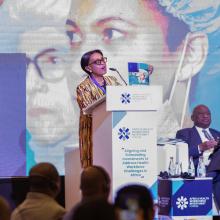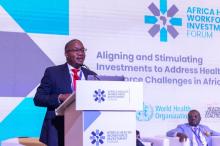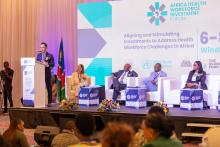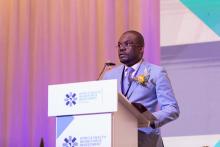World Health Organization launched the Africa Health Workforce Investment Charter in Namibia
The World Health Organization (WHO) in collaboration with the government of Namibia hosted the inaugural Africa Health Workforce Investment Forum in Windhoek, from 06 – 08 May 2024 themed “Aligning and Stimulating Investments to Address Health Workforce Challenges in Africa”. The Forum brought together over 180 participants across Africa and globally, including Ministers, Permanent Secretaries, Directors, Partners, and stakeholders from the health, education, finance, labour, and private sectors.
Officiating the Forum, Right Honorable Dr. Saara Kuugongelwa-Amadhila, Prime Minister of Namibia underscored that “For health professionals to do their work effectively, they must be well-resourced and capacitated in the best ways possible. It is thus important to ensure that governments make the necessary investments not only in the public health systems overall, but specific attention must be given to strengthening the health workforce.”
A 10-year assessment report released by WHO Regional Office for Africa during the Forum showed that the African Region has recorded a remarkable expansion by 70% in its capacity to train health professionals, increasing from 150,000 graduates in 2018 to over 255,000 in 2022. This significant growth stems from the expansion of more than 4,000 training institutions and programs across the Region, resulting in the number of health workers in the Region more than tripled from 1.6 million in 2013 to 5.1 million by 2022, including 850,000 community health workers. The increased health workforce has improved access to health services, bringing the ratio of health professionals—comprising doctors, nurses, midwives, dentists, and pharmacists—from 11 per 10,000 people in 2013 to 27 per 10,000 by 2022.
Despite these strides, projections indicate a potential shortfall of 6.1 million health workers by 2030, which is necessary to effectively tackle the Region's disease burden through comprehensive health promotion, disease prevention, treatment, rehabilitation, and palliation. Also, nearly 27% of the trained health workers remain unemployed, underscoring a mismatch between training outputs and actual job creation. This gap requires a 43% increase in current funding levels dedicated to health workforce employment. Moreover, the Region has faced challenges related to suboptimal working conditions, with at least 14 countries experiencing an average of four instances of health worker industrial unrest or strikes annually since 2018, while brain drain continues to be a significant issue, with one out of every ten doctors or nurses trained in Africa now working abroad.
During the Forum, the Africa Health Workforce Investment Charter was officially launched, marking a high political commitment to addressing the rights and aspirations of Africans in accessing skilled health workers in the African Region. Launching the Charter, Dr Matshidiso Moeti, WHO Regional Director for Africa said, “all the sectors need to incorporate the health sector workforce priorities into their sectoral plans and join the health sector in developing national health workforce investment compacts to firmly outline the commitments of governments and partners”. She noted that “Our collective efforts are crucial to addressing these challenges faced by the health workforce in Africa”.



